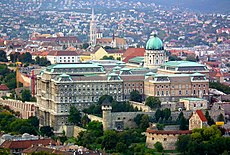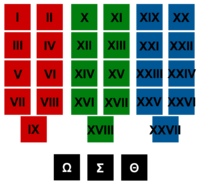Tiranis Phrontis
This article is incomplete because it is pending further input from participants, or it is a work-in-progress by one author. Please comment on this article's talk page to share your input, comments and questions. Note: To contribute to this article, you may need to seek help from the author(s) of this page. |
 | |
 Prosvity Palace, built in the 17th century for the academy | |
| Motto | Scientia vincit (Solarian) ("Knowledge triumphs") |
|---|---|
| Formation | May 9, 1640 |
| Headquarters | Samistopol, Soravia |
Membership | 27 seats |
Provost | Piatro Suldesova |
| Website | tiranisphrontis.nr |
The Tiranis Phrontis (Ancient Piraean: Τιράνης Φροντίς; Tiránís Phrontís, TPh, Soravian: Тіраніс Фронтіс; Tiranis Frontis, TF, lit. "Royal Phrontistery") is an academic organisation and learned society specialising in the sciences and mathematics in Soravia. Comprised of the country's leading scientists, mathematicians and often other academic minds, the Phrontis, as it is often shorthandedly referred to, has been one of the highest ranking academic bodies in Soravia since its inception, being the site of many scientific discoveries from the 17th century to the modern period.
Founded in 1640 by King Louis II, the Phrontis was named in Ancient Piraean due to its philosophical and educational connotations. The academy was initially comprised of scientists and scholars appointed directly by the king, but switched to an electoral system in 1650. The Phrontis was popularised as one of Euclea's foremost scientific bodies when member Lawrence Lugin, 1st Marquis of Krada discovered and proved the theory of universal gravitation at Prosvity Palace in 1643. The Phrontis attracted many scholastic minds from across Euclea through the 17th century, particularly from countries in the west. Lugin was later elected as the academy's inaugural Provost in 1660, splitting it into three sections of nine seats, referred to as "columns" – the Judamian column, named for Attiyah al-Judami, represented the sciences, the Ovidian column, named for Ovidus, represented philosophy, and the Hippodalian column, named for Hippodalia, represented religion. These columns are still retained in the Phrontis to this day, although their academic connotations have largely been lost.
The TPh is headquartered at the Prosvity Palace in Samistopol, a location it has kept since its foundation. Despite policies against the use of Piraean and Solarian in Soravia, the Phrontis' prestige as an institution allowed it to retain its linguistic influences during the early republican period. Today, its purpose is mainly served in higher education, where the Phrontis specialises in delivering lectures and assisting students with transitions into university-level STEM subjects.
History
Membership
Current members
| Seat | Name | Years active | Occupation |
|---|---|---|---|
| Most recent occupants of the front seats | |||
| Ω | Macarius II, Radushian Patriarch | August 17, 2020 | Supreme Patriarch of Radushia |
| Σ | Makis Schecter | August 17, 2020 | Mathematician |
| Θ | Quan Bo | August 17, 2020 | Mathematician and analyst |
| Jadamian column | |||
| I | Vladimir Vorobev | 1998–present | Poet and essayist |
| II | Lyuba Lebedeva | 1997–present | Historian |
| III | Anatolii Pavlov | 2010–present | Astronomer |
| IV | Dawid Dudek | 2013–present | Astronomer |
| V | Shura Pushkina | 2004–present | Chemist and doctor |
| VI | Naum Ivanov | 2019–present | Geologist |
| VII | Sevastian Nikitin | 1988–present | Political activist |
| VIII | Emanuel Milosovici | 2000–present | Marine biologist |
| IX | Beniamin Iliescu | 2001–present | Oceanographer and explorer |
| Ovidian column | |||
| X | Stanimir Istina | 2009–present | Political Philosopher |
| XI | |||
| XII | |||
| XIII | Geto Borisov | 2013–present | Natural Philosopher and Physicist |
| XIV | |||
| XV | |||
| XVI | |||
| XVII | |||
| XVIII | Boris Idenev | 1993–present | Philosopher and Polymath |
| Hippodalian column | |||
| XIX | |||
| XX | Violeta Getova | 2018–present | Scriptural Scholar and Church Historian |
| XXI | |||
| XXII | |||
| XXIII | Todor Angelev | 1995–present | Bishop and Speculative Theologian |
| XXIV | |||
| XXV | |||
| XXVI | |||
| XXVII | |||
Awards
Organisation
The Phrontis convenes in the central chamber of the Prosvity Palace, a baroque-era hall designed by Etrurian architects Celestino Belucci and Martino Segese. The seating is divided into three distinguishable columns, the Jadamian column (left; red), the Ovidian column (centre; green) and the Hippodalian column (right; blue). In total there are 27 permanent seats of the Phrontis, all of whom call themselves members. In addition to this, there are three extra seats situated at the very front of the chamber, the omega (Ω), sigma (Σ) and theta (Θ) seats. These seats and reserved and designated for distinguished guests who attend meetings of the Phrontis when it convenes. People who occupy these seats do not call themselves member and they are not counted toward the seat tally of the academy in any official way.
The chamber is headed by a Provost, an elected leader who serves the duration of their life or until they resign the position, whichever comes first. The Provost tables meetings and designates awards from the Phrontis, as well as conducting some administrative business. The position is largely figurehead today, and is often awarded to long-standing members of the Phrontis.
Members wear red robes during official gatherings, a tradition that stems from the 17th century noble, religious attire that members wore to the palace.
